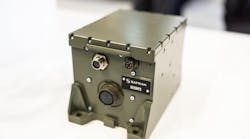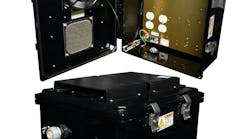By John McHale
BURLINGTON, Mass. — Engineers at Cetia in Burlington, Mass., have announced an AltiVec version of their PowerEngine — VMPC6c and VMPC6c-dual — for radar and sonar applications.
"The PowerPC7400 expands our market into a new segment and is a less expensive way of doing certain applications," says Hubert Canuet, vice president of worldwide sales for Cetia.
In traditional designs, single-board computers handle data processing, while dedicated hardware called digital signal processors (DSPs) handle the signal processing, Canuet explains. Now along comes the AltiVec chip from Motorola's Semiconductor Product Sector in Austin, Texas, which not only handles data processing but also captures the performance and functionality of a signal processor, he continues.
Software for PowerPC chips is also less expensive than that of DSPs and is easier to program, Canuet claims. The VMPC6 will be in a sonar system from Thomson Marconi that is going on Australian navy frigates, Canuet says. It is also going on the France's CMT minehunter, he adds.
The device is available in single- or dual-processor configurations with one or two PowerPC 7400s running at 400 MHz. The next generation of Cetia's real-time VME single-board computers have the ability to replace as many as 10 32-bit floating point DSPs with one PowerPC7400 processor due to its 128-bit AltiVec unit, Cetia officials say.
The AltiVec vector-processing unit is particularly fast in signal processing applications, which is especially helpful in radar and sonar, Cetia officials explain. "We continue to expand our product offerings by expanding the flexibility and reliability with each new generation," says Yvon Peresse, chief executive officer and president of Cetia.
The VMPC6c design uses a high-speed crossbar PowerPC chipset from IBM called the CPC7100. This crossbar runs at 133 MHz and sustains an aggregate throughput of 2.788 gigabytes per second.
The CPC7100 enables the PowerPC bus to perform at a transfer speed of 1.064 gigabytes per second, with ECC memory. It also permits two independent PCI buses to run at 528 megabytes per second and 132 megabytes per second.
In one 6U VME slot, the VMPC6c provides the user with one or two PowerPC7400s running at 400 MHz, each equipped with a 2 megabyte L2 cache running at 200 MHz. It also has a 64 bit PCI bus running at 66 MHz, connected to the PMC mezzanine and dedicated to user-defined I/O, and a 32 bit PCI bus running at 33 MHz, providing access to the VME64 bus, the ultra-fast SCSI, Ethernet 10/100 and serial lines.
The VMPC6c has 64 to 512 megabytes of fast SDRAM with ECC, organized in a double parallel bank. The VMPC6c and VMP6c-dual also provide the necessary real-time operating system extensions to ease development of high-end, real-time data- and signal-processing applications on multiprocessor boards, available for the LynxOS and VxWorks real-time operating systems, Cetia officials say.
A VSIPL library optimized for the PowerPC 7400 processor will increase the performance of the AltiVec vector-processing unit, while simplifying the programming of portable signal processing code, Cetia officials explain.
Cetia engineers also provide their DDLink software package, which manages and optimizes data transfers between processing units in large-scale signal processing applications that depend on several different computing nodes.
The VMPC6c is optionally equipped with Cetia's Ruggedizer technology. This technology consists of a patented conformal aluminum plate, which extracts heat in conduction or convection modes and enables the board to withstand severe shock and vibration, decreasing the junction temperature of the VMPC6c's electronic components.
For more information on Cetia contact Cynthia Bocko by phone at 781-229-7930, by email at [email protected], or on the World Wide Web at http://www.cetia.com.



